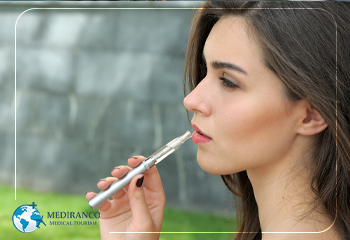Stop Smoking Before and After Surgery : Plastic surgery success is influenced by both the surgeon’s skill and the patient’s lifestyle choices. Smoking is a critical factor, as it can compromise blood flow, impede healing, and increase the risk of complications. This guide emphasizes the importance of quitting smoking both before and after plastic surgery, as it can significantly alter the efficacy and safety of cosmetic procedures.
Quitting smoking is not just a pre-surgical requirement but also extends into the post-operative period, ensuring optimal healing, minimizing infection risks, and achieving desired aesthetic results. By understanding the risks and benefits of quitting, patients can make informed decisions about their health and well-being, leading to better surgical outcomes and a safer journey towards achieving their aesthetic goals.
Table of Contents
ToggleThe Importance of Quitting Smoking Before Surgery
Quitting smoking is crucial for surgical procedures, including plastic surgery, as it significantly impacts the body’s ability to heal and recover. Nicotine in cigarettes constricts blood vessels, reducing blood flow and oxygen-carrying capacity, which is essential for wound healing and infection prevention. Non-smokers experience a smoother recovery process, enhancing surgical results and post-surgery experience. Quitting smoking can improve the body’s natural healing abilities, reduce complications, and enhance the overall surgical experience.

Improved Surgical Results
Quitting smoking before surgery not only reduces the risk of complications but also leads to better outcomes, including more aesthetically pleasing results in surgeries requiring skin integrity. Non-smokers also report higher satisfaction with their surgical results due to reduced complications and a smoother healing process. Additionally, non-smokers generally perform surgeries more straightforwardly, reducing intraoperative issues.
How long before plastic surgery should you quit smoking?
Medical professionals recommend quitting smoking four to six weeks before surgery to allow the body to repair damage caused by smoking. This improves blood flow, oxygen levels, and inflammatory response, crucial for surgical success. Longer abstinence leads to better results and faster recovery. Even a few weeks before surgery can be beneficial. Postoperatively, remaining smoke-free aids in healing and maintains surgical results. Consulting healthcare providers for advice and support is highly recommended for those considering surgery.
The Consequences of Smoking Before Plastic Surgery
Smoking before having plastic surgery can have a number of negative effects that could jeopardize the procedure’s safety as well as the outcome’s quality. The following are some significant effects:
- Increased Risk of Surgical Complications:
Research has demonstrated that smoking considerably augments the likelihood of surgical complications. Nicotine narrows blood arteries, which lowers blood flow and the amount of oxygen and nutrients that reach surgery sites. Complications include blood clots, greater bleeding during surgery, and anesthesia-related issues might result from this reduced blood flow.
- Impaired Wound Healing:
Smokers’ decreased oxygen and blood flow also impede the body’s ability to heal wounds. Longer recovery periods, inadequate wound healing, and in certain situations, wound dehiscence—the reopening of a wound following surgery—can be the outcome of this. Smokers also have an increased chance of infection at the surgery site, which can further impede healing and perhaps result in more serious health problems.
- Diminished Aesthetic Outcomes:
Smoking can seriously impair the aesthetic look that is often the goal of plastic surgery. Tissue death (necrosis) can result from inadequate blood flow, especially in procedures involving skin flaps or transplants. This may lead to scarring and unsatisfactory cosmetic results, possibly requiring further corrective surgery.

Strategies for Quitting Smoking Pre-Surgery
Quitting smoking before surgery is crucial for a successful operation and recovery. Breaking the habit can be challenging, but there are various strategies and aids available to help. Patients should explore these options and choose the one that suits their needs and lifestyle.
Consulting with Healthcare Professionals for Stop Smoking Before and After Surgery
Healthcare professionals should be consulted to help patients quit smoking, especially those planning surgery. They can offer personalized advice, assess health, and suggest effective methods. Doctors may also refer patients to smoking cessation specialists or support groups, who can offer practical advice, emotional support, and strategies to cope with cravings and withdrawal symptoms. Engaging in a support network can significantly increase the chances of successful cessation, especially during the stressful period leading up to surgery.
Nicotine Replacement Therapy (NRT) and Other Aids
Nicotine Replacement Therapy (NRT) is a popular aid for smoking cessation, delivering controlled amounts of nicotine to the body without harmful chemicals. It helps reduce withdrawal symptoms and cravings, easing the transition away from smoking. Prescription medications like Bupropion and Varenicline can also help, but should be taken under healthcare provider’s guidance.
Combining NRT or medications with behavioral strategies like cognitive-behavioral therapy, mindfulness, and stress management can be effective in helping individuals understand and overcome smoking habits. Consulting with healthcare professionals, exploring NRT options, and considering additional medications and behavioral techniques are all viable paths to a smoke-free life, leading to better surgical outcomes and overall health.
The Critical Role of Non-Smoking in Post-Surgery Recovery
Quitting smoking is not only necessary before surgery; it is also very important during the recovery time. The choice to abstain from smoking following surgery is crucial to healing and has a significant influence on the procedure’s long-term outcome.

Faster Healing and Reduced Complications
Non-smoking after surgery promotes faster and more effective wound healing due to reduced oxygen supply and constricted blood vessels caused by nicotine. This leads to longer healing times, increased risk of infection, and scarring. A non-smoking environment allows for better blood flow and higher oxygen levels, essential for tissue repair. Stop smoking also reduces the risk of postoperative complications, including minor issues like delayed wound healing and serious ones like blood clots, pneumonia, or reopening of the surgical site. Staying smoke-free ensures a smoother recovery and contributes to overall health post-surgery.
Long-term Benefits for Aesthetic Results
Plastic surgery patients prioritize aesthetic outcomes, and maintaining a non-smoking lifestyle is crucial for preserving the integrity and longevity of these results. Smoking accelerates skin aging, leading to increased wrinkles, sagging, and dull complexions. Non-smoking post-surgery helps maintain skin elasticity, vitality, and symmetry, preventing uneven healing or disproportionate scarring.
In procedures like facelifts, breast augmentations, and skin grafts, the quality of skin and underlying tissues is crucial for the desired appearance. A commitment to a smoke-free lifestyle post-surgery is essential for achieving the best possible outcomes and maintaining them over time.
Overcoming the Challenge: Post-Surgery Smoking Cessation
For many people, getting through the recovery phase without picking up smoking again is quite difficult. Nicotine’s tendency to build habits can combine with the tension of recuperation to create an allure to pick up smoking again. But, it is quite feasible to continue living a smoke-free lifestyle following surgery with the correct assistance and a well-thought-out plan, guaranteeing the greatest possible healing and long-term outcomes.
Developing a Post-Surgery Plan for Stop Smoking After Surgery
A structured plan to avoid smoking after surgery is crucial, starting with clear, achievable goals. Recovery can be vulnerable, and the urge to smoke may be stronger. Identifying triggers like stress, social situations, or drinking can help develop strategies to cope. Patients can practice stress-relieving techniques like deep breathing, meditation, or light exercise. Seeking smoke-free social environments or informing friends and family about the commitment to not smoking can provide additional support.
Support Systems and Resources for Stop Smoking Before and After Surgery
A strong support system can significantly improve the chances of avoiding smoking post-surgery. Support groups, professional counseling, and online resources can provide encouragement, accountability, and a sense of community. Counselors can offer personalized advice and coping strategies, while online resources like apps and forums can offer daily motivation and virtual support. A well-thought-out plan, awareness of personal triggers, and a strong support network can help patients achieve a successful recovery and enjoy the long-term benefits of their surgical procedures without the adverse effects of smoking.
The Consequences of Smoking After Plastic Surgery
After plastic surgery, smoking can have just as much, if not more, negative effects. The main issues are as follows:
- Compromised Healing Process:
Similar to the pre-surgical stage, the body’s capacity to repair after surgery may be significantly impacted by narrowed blood vessels and lower blood oxygenation. This may result in longer healing times, more pain and suffering, a higher risk of scarring, and less pleasing results from an aesthetic standpoint.
- Increased Complication Risk:
Smokers are much more likely to experience postoperative problems such as blood clots, infections, and inadequate wound healing. Strong blood flow is necessary for the healing tissues to recover, and smokers’ reduced blood flow can cause tissue necrosis, sluggish healing, and in extreme situations, the loss of surgical flaps or grafts.
- Long-Term Effects on Results:
Smoking has a significant long-term impact on the results of plastic surgery. Smoking causes wrinkles and a reduction in the suppleness of the skin by hastening the aging process of the skin. The advantages of operations like facelifts, eyelid surgeries, or skin rejuvenation treatments may be overruled by this. Furthermore, smoking might worsen uneven healing outcomes and asymmetry, particularly in treatments like breast augmentation or reconstruction.
Conclusion – Is it more important to stop smoking before or after surgery?
The journey of plastic surgery is significantly influenced by a patient’s smoking status. Quitting smoking before surgery and maintaining a smoke-free lifestyle postoperatively are crucial for optimal results and a smooth recovery. Mediranco, a leading service provider in Iran, is known for their expertise, personalized care, and understanding of the complexities involved in plastic surgery procedures. Their commitment to patient well-being and emphasis on pre- and post-surgical care aligns perfectly with the principles of successful plastic surgery outcomes, making them a top choice for patients prioritizing quality and safety.

Plastic Surgery in Iran
Plastic surgery in Iran can offer significant cost savings for cosmetic and plastic procedures. Compared to the United States and other countries, the expenses for plastic surgery in Iran are notably lower, making it an attractive option for medical tourists worldwide

